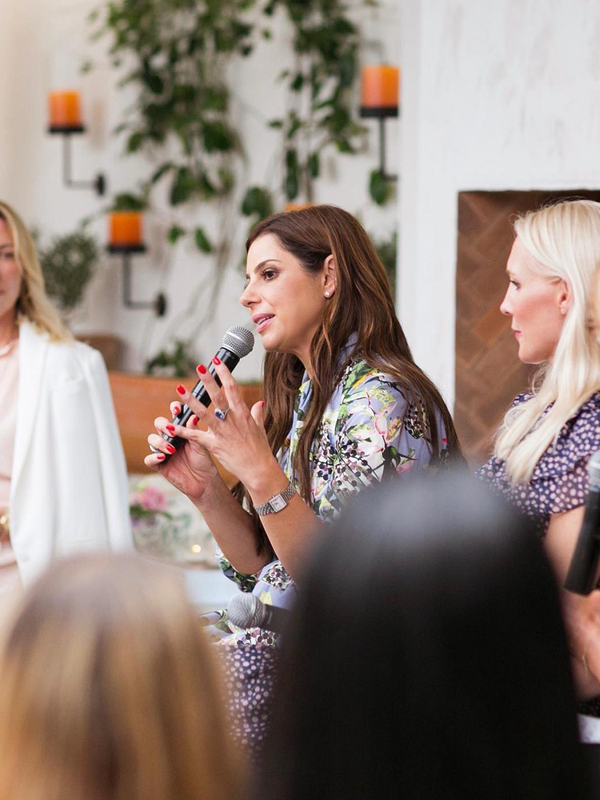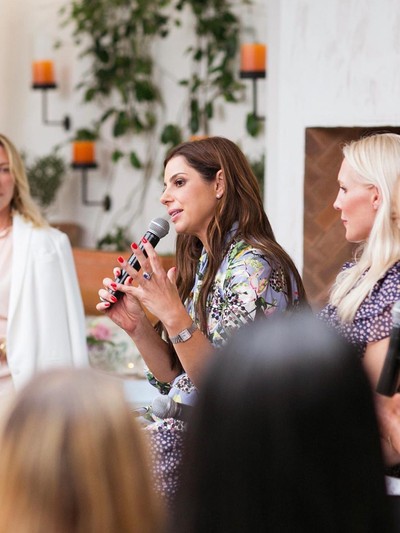
How To Make Friends As An Adult
When you’re a child it seems so easy to make (and break) friends, but as an adult, making friends somehow becomes so much harder. Why is that? “As a child we spend a lot of time in social activity, learning the rules of engagement and meeting lots of new people,” says psychotherapist Ali Moore. “As a child, you aren’t as self-aware; you could play without being self-conscious and you’re not aware that other people might have opinions about you – you don't recognise judgement.”
But as an adult, that self-awareness is now all too prevalent. “You may fear rejection, you may have expectations of people that they can’t meet and subsequently be disappointed, you may be wary of making friends and then their expectations of us,” explains Ali. “All of this can be underpinned by our past experiences and how our self-esteem has developed; how much you value yourself and feel confident.”
But making and maintaining friendships is crucial to your wellbeing. Ali tells us: “Every time a new friendship is created this sense of worth and your self-esteem gets a boost helping to release feel good chemicals such as serotonin and dopamine. New friendships spark the need for new information which creates activity in the brain as you process what's happening and keeps your mind active.” So, how exactly can you make friends? Ali gives us her pointers…
Make Sure You’re Comfortable
There’s an idea that to be open to meeting new friends you must become a ‘Yes Man’. But while it’s good to positively push yourself, you shouldn’t make yourself feel uncomfortable in order to accommodate others, because that’s not an honest representation of who you are. Ali explains: “You need to be comfortable with who you are and feel able to express yourself. You need, of course, to listen to other people's point of view and be open to new and different ideas – it’s always good to compromise so both people gain from the friendship. But you don't want to agree to everything, and you certainly shouldn't have to change who you are.”
Find Groups Suited To Your Interests
One of the hardest things about meeting new people is knowing exactly where to meet them. As an adult, you aren’t in many situations beyond work where you’ll meet people. But there are groups you can join that are essentially made for making friends. For new parents, baby/parent groups are a great way to meet people in a similar place in life, and offers great support, says Ali. “If you’re in business then networking groups, especially the ones for women, are fabulous at building new contacts. Exercise classes are great to have those brief initial chats and then arrange to see each other at the following session. Also check out local magazines and publications which give details of special interest groups or coffee mornings. I would avoid places like pubs and clubs because people are already in groups and it can be noisy and feel a bit intimidating on your own.”
Show That You’re Open To Meeting New People
When it comes to meeting new people, how you hold yourself is going to make a big difference to how many (platonic) phone numbers you get at the end of the night – you need to throw yourself into the experience. “Just start by making conversation and showing an interest. People want to feel listened to, so making eye contact with whomever you’re talking to will help,” Ali says. But that isn’t to say you have to be a beacon of confidence, it’s more about being open with people: “It's totally fine to say that you’re nervous or unsure of what to say in new situations. But showing an interest and facing people, nodding and engaging with verbal cues are all great starts. The tough part can be going and making that first contact.”
Ask Open Questions
To initiate conversation with new people, it’s important to ask open questions that encourage an open dialogue. “Ask them about themselves!” Ali encourages, such as “Tell me a bit about yourself”, “What interested you in this group/activity?” or “What do you do in your spare time?”. Ali advises avoiding asking questions about family as this can be personal and people might not be ready to share that information yet. If you can find a common ground however, such as children, that can be the perfect topic to break the ice.
Use Technology To Your Advantage
Your phone could be the key to making new friendships – it’s what will likely help you find places to meet friends and then what you’ll use to maintain new friendships. First, there are some great apps to help you make friends: Meetup, Peanut, Happn are all designed to put you in touch with like-minded people to start a platonic relationship, while more offbeat apps like Meet My Dog and Foursquare City Guide give you an interesting topic to bond over. (Find more apps for making friends here.)
Then, once you’ve got a couple of friends under your belt, your phone is the best way to keep in touch. Having conversations with new people can be really daunting, and even more so to speak to someone on the phone. In fact, a 2017 survey by Ofcom showed that only 15% of young people consider phone calls to be the most important method of contact. So, find other ways to keep in touch: “Once you’ve made a connection, talking online using Messenger or WhatsApp is quick, easy and non-intrusive,” adds Ali. “So, no need to worry if you’re bothering or interrupting someone – they can reply in their own time.”
Start Small
If you’ve met someone that you think you’d get on well with, treat it like a date – take it slow. Don’t book anything too extravagant into the calendar, but rather, do something that requires only a little commitment. “At this new stage you are scoping out each other’s interests but also seeing how much you have in common. It's an obvious one but a coffee and catch up is a great start – it's long enough to get a conversation going but doesn't commit you to an activity,” explains Ali. “Cinema is great because you have chat time before then enjoy the movie and some chat afterwards.” Once you get to know each other better, you can start planning bigger outings that bring together your interests and spark interesting conversations, such as museum visits, theatre trips, or shopping sprees: “Start small and work your way up.”
Ali Moore’s Top Tips For Creating A New Social Circle
Look for groups and organisations that have shared interests with you: This means you will have something in common with the people there from the off. And if there isn't one, take a step to be brave and start your own.
When you arrive at an event find the person who organised it: Let them introduce you to a few people so you don't have to interrupt others’ conversations.
Take things at your own pace, and be a good listener: Ask people about themselves, it’ll show interest and makes it easier than having talk about yourself.
Exchange contact details: It doesn’t have to be a big deal – it’s normal nowadays to text rather than call. So, check in on a regular basis, simply text and ask how they’ve been.
Don't expect someone to be free every time you ask them to meet up: Life is busy, so don’t take it personally. Simply suggest a different date or time or ask when they’re free.
Accept that some people will click, and some won't: Try not to be disappointed if a friendship doesn't blossom – smile and keep mingling!
DISCLAIMER: We endeavour to always credit the correct original source of every image we use. If you think a credit may be incorrect, please contact us at info@sheerluxe.com.







